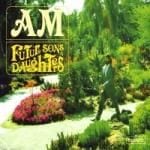
One indisputable fact about music in the noughties is that indie artists had a better chance than ever to pique the mainstream thanks to their newfound appetite (or tolerance) for soundtracking commercials and television dramas. Such crossovers have no doubt engendered derision from fans, as when Pavement frontman Stephen Malkmus’ “Phantasies” appeared on a corny Sears commercial promoting a 13-hour sale. But there is reason to believe that, far from selling out, such exposure is the most practical route to a band’s survival when record sales are contracting and just about everyone is making music that demands to be heard.
The Los Angeles-based AM is one band that has not only taken a shine to being televised but was honoured with having every song on its debut album, Troubled Times, placed in a movie or television show. The album was also endorsed by that great commercial juggernaut Apple as one of iTunes’ Best Albums of the Year.
Back then in 2006, the group, helmed by a Tulsa-born, New Orleans-raised singer/songwriter/guitarist of the same name, crafted tunes that were heartfelt in sentiment, polished in structure, lyrically thoughtful but less ambitious in sound than Wilco, with whom they have often been compared. In other words, their music bared a classic roots generality that made it versatile enough to accompanying anything from The Real World to Brothers and Sisters.
Future Sons and Daughters, AM’s third album, might find it harder to meet the same fate. If we must wangle its spectral blend of ’60s folk rock, British twee pop, seventies funk, and Brazilian Tropicalista onto a soundtrack, then it would appear to be most at home with a movie like The Serious Man. But that would be to do the undesirable.
Insofar as Future Sons and Daughters is self-consciously retro, it is due mainly to the fact that the instruments and sound equipment used on it date back no later than 1970. The fact, though, is that the album has all the lauded effortlessness and sincerity of AM’s best pop compositions, and none of the pastiche that would be expected of something that is an overt homage to the Byrds, Jorge Ben, et al.
The opening “A Complete Unknown” immediately indicates this new trajectory with displays of handclapping jauntiness and harmonies typical of early minor-chord Beatles ballads. Its echoing vocals recall Traffic’s “Hole in My Shoe”, while its flecks of organ hint at the first incarnation of the Animals. To top things off, percussionist Chris Lovejoy’s conga adds an intimation of Latin funk. Despite its ostensive eclecticism, at no point does the song buckle under the weight of its references. Rather, “A Complete Unknown” is a remarkably simple song — less than three minutes — that happens to harbour some pleasantly nostalgic curlicues. “Jorge Ben”, meanwhile, may be an instrumental ode to its Brazilian namesake, but far from serving up the obvious bossa nova cocktail, AM opts for something that sounds like Ennio Morricone knocking heads with Henry Mancini and Herb Alpert.
The songs that are less subtle in their approach to past masters are enjoyable nonetheless. “The Other Side” features an opening salvo and pace similar to Matthews Southern Comfort’s version of “Woodstock”, with the gentle rippling of a 1966 Gibson ES 330 lending unmistakeable interest. Yet the song still manages to sound contemporary to the point that it could have been composed by Jason Mraz during one of his bluesy moments. “Grand Opinion”, on the other hand, begins by swiping the organ refrain from Booker T and the MG’s “Green Onions”. It then graduates to something like the Turtles’ folk pop coupled with Byrds-like harmonies, followed by a short instrumental bridge of baroque pop. After returning to the organ refrain, it dissolves into a neat spaghetti western-style coda. Despite appearances, “Grand Opinion” sounds neither profligate nor like a crate-digger’s “mash-up”. And it isn’t remotely cheesy. Indeed, the song proves the lasting relevance of said elements in a contemporary pop context.
AM’s endeavour to dust off sixties pop wouldn’t be complete without a renewed emphasis on basslines. On the girl-boy duo “It’s Been So Long”, bassist Mark Getten wrings out of his borrowed late-sixties Hofner a groovy motif reminiscent of the Hollies’ “He Ain’t Heavy, He’s My Brother”. As for the rest of the song, imagine, if you will, the Turtles’ modishness brought down to earth by the sullen charm of Glen Hansard and exported to the Rocky Mountain Front via Morricone’s twangy guitar hooks. Sounds ludicrous but the song chimes so effortlessly — almost unjustly so.
Though excellent in their own right, ballads like the Hall & Oates-meets-Beck “Darker Days”, the Roy Orbison-esque “Fortunate Family Tree”, and the Last Shadow Puppets-like “Self Preservation” have the misfortune of appearing amid songs that possess more memorable nods to the past. But this is certainly only a small gripe. For Future Sons and Daughters is the best testament so far of AM’s musical agility. He not only makes past aural innovations his own by combining and reworking them into thoroughly modern compositions, but he does so in a delicate and understated way that prevents his songs from becoming bravura displays of pop historical knowledge. To have let such a display happen would have been the easy thing to do. Easier, even, than getting a spot on TV.

![Call for Papers: All Things Reconsidered [MUSIC] May-August 2024](https://www.popmatters.com/wp-content/uploads/2024/04/all-things-reconsidered-call-music-may-2024-720x380.jpg)



